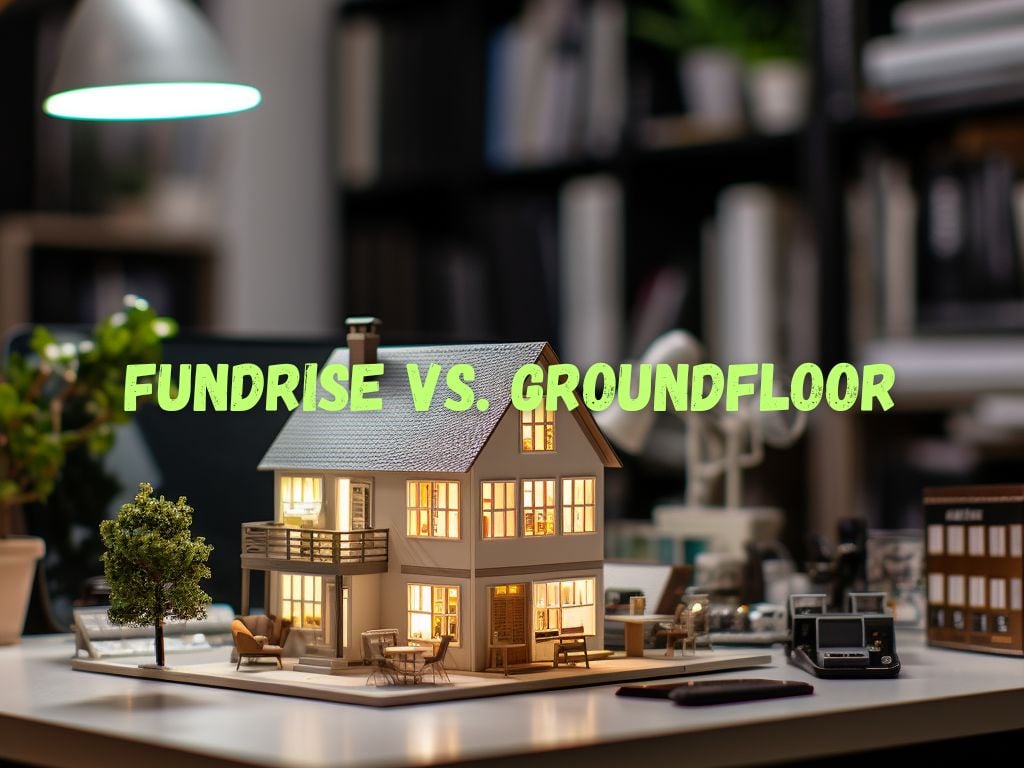When it comes to investing in real estate, choosing the right platform can make all the difference. In this article, we will compare two prominent real estate investment platforms – Fundrise and Groundfloor.
In this Fundrise vs Groundfloor article, we will be exploring the features, performance, pros, and cons of both platforms, you’ll be able to make an informed decision and find the best fit for your investment goals.
Fundrise: Opening the Doors to Real Estate Investment
Fundrise is an innovative online real estate investment platform that allows individuals to invest in commercial and residential properties.
With a minimum investment as low as $500, Fundrise offers an accessible opportunity for both accredited and non-accredited investors to diversify their investment portfolios with real estate assets.
Key Features and Benefits
Fundrise sets itself apart with its unique features and benefits. The platform offers a range of investment options, including eREITs and eFunds.
eREITs are diversified portfolios of commercial real estate properties, while eFunds focus on specific real estate development projects. This variety allows investors to choose the level of diversification that suits their risk tolerance and investment preferences.

Investment Options and Strategies
Fundrise provides a variety of investment options to cater to different investor needs. You can choose between a Starter Portfolio, Core Portfolio, Advanced Portfolio, or a combination of these portfolios.
Each portfolio offers a different level of investment diversity and access to various real estate projects. Fundrise’s investment strategy focuses on creating steady cash flow through rental income and long-term appreciation.
Performance Evaluation
Fundrise has a record of delivering solid performance to its investors. While past performance is not a guarantee of future results, Fundrise has consistently achieved attractive returns.
According to Fundrise, their platform has produced an average annualized return of approximately 8.7% since its inception.
Pros and Cons of Investing through Fundrise
Pros:
Accessible investment opportunity with a low minimum investment requirement.
Diversification through a variety of investment options.
Passive investment with professional management.
Transparent reporting and regular updates.
Ability to invest in both commercial and residential properties.
Cons:
Limited liquidity, as investments typically have a lock-up period of five years.
Potential for fluctuations in returns due to market conditions.
Limited control over specific investment choices.
Non-accredited investors face certain limitations in terms of investment options.
Groundfloor: A Unique Approach to Real Estate Investing
Groundfloor is a peer-to-peer real estate lending platform that allows investors to fund real estate development projects.
Rather than investing directly in properties, Groundfloor enables individuals to participate in short-term loans to real estate developers. This alternative real estate financing model offers investors a different way to capitalize on the real estate market.
Unique Features and Advantages
Groundfloor’s unique feature is its focus on short-term loans to real estate developers. Investors have the opportunity to earn fixed interest rates on their investments, typically ranging from 6% to 14%.
Groundfloor claims that their investment model provides higher risk-adjusted returns compared to traditional fixed-income investments.

Available Investment Opportunities
Groundfloor offers a marketplace of real estate development projects in need of financing. Investors can choose from various loans secured by real estate, based on their risk tolerance and investment goals.
Groundfloor provides detailed information about each project, including the borrower’s track record, loan term, interest rate, and estimated loan-to-value ratio.
Performance Analysis
Groundfloor has achieved positive overall performance since its inception in 2013. However, it is important to note that like any investment, there are risks associated with investing in real estate development projects.
Investors should carefully evaluate the projects offered on the platform and consider factors like borrower credibility, project feasibility, and overall market conditions.
Pros and Cons of Investing through Groundfloor
Pros:
Opportunity to earn fixed interest rates on investments.
Ability to finance real estate development projects.
Accessible to both accredited and non-accredited investors.
Transparent project details allow for informed investment decisions.
Potential for higher risk-adjusted returns compared to traditional fixed-income investments.
Cons:
Higher risk compared to investing in income-generating properties.
Lack of diversification, as investments are tied to individual projects.
Limited liquidity, as investments are typically locked in until the loan term ends.
Potential delays or defaults in loan repayments can impact returns.

Comparison: Fundrise vs Groundfloor
To help you make a well-informed decision, let us compare Fundrise and Groundfloor on several key factors:
Minimum Investment Requirements:
Fundrise: $500
Groundfloor: $10
Types of Real Estate Investments Offered:
Fundrise: eREITs and eFunds with diversification across commercial and residential properties.
Groundfloor: Short-term loans to real estate developers.
Risk Factors and Investor Protection:
Fundrise: As with any real estate investment, Fundrise carries market risk, with both potential for returns and losses. Fundrise provides regular updates and transparent reporting.
Groundfloor: Investing in real estate development projects involves higher risk, including potential delays or defaults in loan repayment. Groundfloor performs extensive underwriting and provides project details for investors to evaluate.
Liquidity and Accessibility:
Fundrise: Investments in Fundrise typically have a lock-up period of five years, making liquidity limited in the short term.
Groundfloor: Investors can choose from loans with durations ranging from six to twelve months, providing relatively shorter investment periods.
Fees and Charges:
Fundrise: Fundrise charges an annual advisory fee of 0.15% and an asset management fee of 0.85%.
Groundfloor: Groundfloor charges an origination fee to borrowers but does not charge any fees to investors.
User Experience and Customer Support:
Fundrise: Fundrise offers a user-friendly online platform with comprehensive investment reporting and a dedicated customer support team.
Groundfloor: Groundfloor provides an intuitive platform for investing and offers customer support through email and phone.
Expert Opinions and Reviews
Experts generally regard both Fundrise and Groundfloor as reputable real estate investment platforms, albeit with differing investment models.
While Fundrise provides a more diversified approach through eREITs and eFunds, Groundfloor focuses on shorter-term loans to developers.
Investors should weigh the advantages and risks of each platform based on their personal financial goals and risk tolerance.

Frequently Asked Questions
Is Groundfloor better than Fundrise?
Both platforms have their own unique advantages and drawbacks. It ultimately depends on your investment preferences and goals. While Fundrise offers diversification and access to a wider range of properties, Groundfloor provides the opportunity to fund specific real estate development projects.
Can you really make money with Groundfloor?
Yes, it is possible to make money with Groundfloor. However, investors should carefully evaluate each project and consider the risks associated with real estate development lending.
What is the difference between Groundfloor and Fundrise?
The main difference lies in the investment models offered. Fundrise focuses on providing access to diversified portfolios of commercial and residential properties, while Groundfloor allows investors to participate in short-term loans to real estate developers.
How much money can I make with Groundfloor?
The returns on Groundfloor investments are primarily generated through fixed interest rates. Actual returns may vary depending on loan performance and project success.
Conclusion
In conclusion, both Fundrise and Groundfloor offer unique opportunities for real estate investors. Fundrise allows for diversification and passive investing, while Groundfloor provides a different avenue for investors interested in real estate funding.
By considering factors such as risk tolerance, investment goals, and liquidity preferences, investors can choose the platform that aligns with their individual needs.
Remember, always perform thorough due diligence and consult with a financial professional before making any investment decisions.


 Tags:
Tags:










